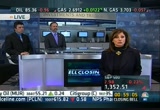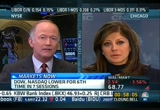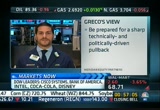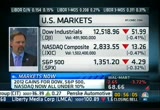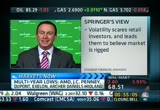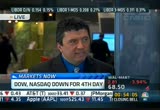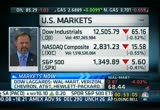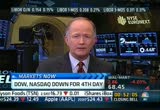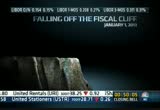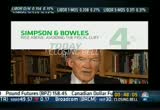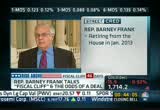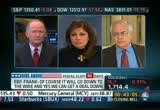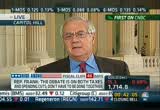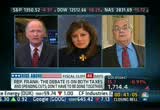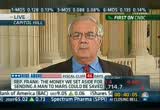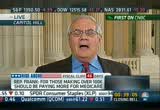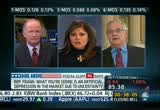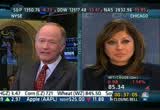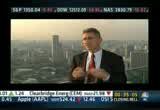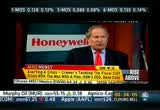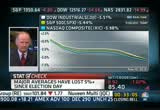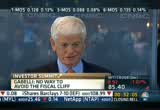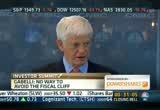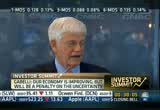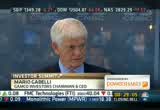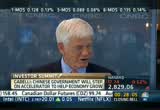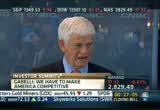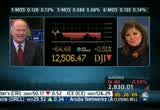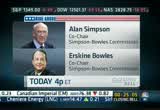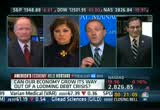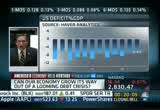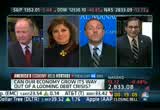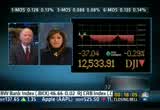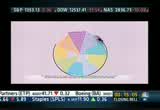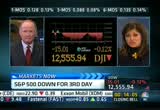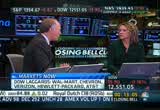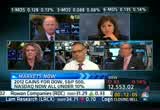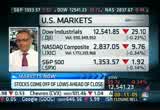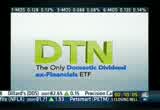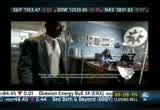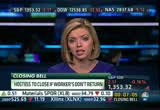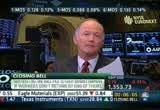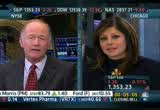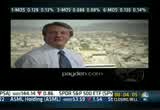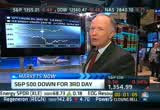tv Closing Bell CNBC November 15, 2012 3:00pm-4:00pm EST
3:00 pm
they're going to be donated to sandy relief efforts. >> thanks for watching "street signs," everybody. it's a good time for a yodel. let's hope they get a deal worked out. >> we certainly do. "closing bell" is coming up next. to me, the most important thing is we solve both at short-run fiscal cliff and longer-run fiscal issues. i think if we do that, the economy can boom. >> i'm hoping to use a phrase i've heard recently, that everybody can rise above the politics that we see here all the time. >> if the guys in washington don't get together and actually act like grown-ups, we're in big trouble. hi, everybody. time to rise above and keep the country from enduring a self-inflicted crisis. we're here today. i'm maria bartiromo coming to you live from the schwab impact conference in chicago. welcome to the "closing bell." we enter the final stretch for the markets today. everybody here is focused on the fiscal cliff. coming up, i will talk to allen
3:01 pm
simpson and erskine bowles in an interview you cannot afford to miss. hope you join us 4:00 p.m. eastern. the co-founders of the fix the debt campaign, which many corporate leaders are backing. they'll tell us how they think washington can come together and reach a deal, bill. >> sure would be great to figure that out. maria, looking forward to that. i'm bill griffeth here at the new york stock exchange. markets continue to feel the sting of the uncertainty surrounding the fiscal cliff crisis. look at the dow, for example. it can't decide whether to go higher or lower today. it's been zigging and zaging all session today. down 42 points. that's about the midpoint of the range. the nasdaq is down 11 points, about 1/3 of a percent. the s&p 500 index also trading lower, down 3 1/3 points. some long-time traders may say the first and final hours of the trading day are the most
3:02 pm
important. since the market highs back on september 14th at the time that qe-3 was announced by the fed, the s&p 500 has suffered the biggest percentage declines in the final hour. this chart shows a typical trading day. higher in the morning and especially lower in the afternoon. how does this play into investor participation? that's what we're going to talk about among other things in today's "closing bell" exchange. brian singer and jeff cox. keith springer and joe greco. joe, what about it? institutional trade verrs have d this market. they decided to sell that last hour. what does that say to you right now? >> surely the clock management you're talking about is really how desks are handling the intraday play. no one really wants to go home long a market in an environment
3:03 pm
where there's -- well, there was uncertainty, obviously, until last the presidency. now we have, you know, continued trauma with what's going on in europe in addition to what's going to happen in washington. clearly, there's just a further divide between one side and the other. that just poses itself that the markets are going to be heading lower. people want to take off. they're not going to be exposed overnight. during the day, it's a lot of back and forth ping-pong and people looking at single stock games and trying to do the best they can. >> yeah, unfortunately all of this uncertainty has led to this sharp decline since the election. s&p capital iq says the market value of all companies on publicly traded exchanges of the major exchanges has dropped by $750 just since november 5th. brian singer, let me ask you about that. would you be poised to put money to work in this selloff, or do you want to get to the sidelines until the dust settles? >> generally speaking, i think
3:04 pm
the environment is one where you want to look for an opportunity to actually step in over the coming six weeks or so as we get to the end of the year. as we approach the fiscal cliff, our baseline assumption is that there will be resolution, we won't go off the fiscal cliff, but there will be tremendous volatility, and that should provide an opportunity to step in. >> keith, what do you think the message of the market is with the kind of trading pattern we're seeing and the big losses we've suffered since the election? what is this market telling you, and what are you doing about it right now? >> it's pretty clear, bill, that a lot of the hedge fund managers really believe that romney was going to win. they were surprised by his loss. they came in and hit the market. of course they're nervous about europe blowing up again and the fiscal cliff and whatnot. the individual investor has to be weary because institutional traders make the money on the nervousness of individual
3:05 pm
investors. we say invest for need, not for greed. the individual investor has to be careful not to overreact. that's what the institutions want. that's why you see so much volume at the beginning and end of the day. it's important to not overreact, look for opportunities. too many people, individuals, are throughout trying to beat the market when they shouldn't be. they really just look for what they need to do, be it inflation, taxes, look for income and dividends. if they go with what they need, they'll be in much better shape. >> i guess i'm just wondering if we're going to be able to get into this market at much lower levels. jeff cox, i mentioned the $750 billion in loss. that's just the u.s. when you add in global markets, according to rich peterson at capital s&p, it's $1 trillion that's been taken out of market value just since the election. >> it's crazy. if you remember several months
3:06 pm
aer ago, i was on and we talked about technical levels in the market. i said 1350 is an important upside. we cleared that. now we're coming back down again. we're around 1353. if that doesn't hold as support rather than resistance, the next place between here and there, 1278 it the june lows. 1158 we were at last year. there's basically nothing between. where does that leave investors? the fed minutes came out yesterday with an indication there's still an appetite for easing. i think we're paving the way for a possible qe-4, especially pending what happens with the cliff. i think if we get this can kick thing, it's only going to add to uncertainty. a lot of folks are looking for alternatives, not stocks, high yield. they want something different. >> yeah, because they're afraid of equities. >> if you look at a the chart you had earlier and performance
3:07 pm
of the market being strong early in the day, what we have is uncertainty abating from its worst levels in europe. we come into the market here in the u.s. and we see relatively good news. however, once we get into the u.s., we have politicians speaking here. unfortunately, when they open their mouths, it seems to create uncertainty. the other thing is we're now in an environment where the dividend tax rate is 15%. we know it is not going down from here. it will go up from here. investors are now realizing that they have to execute on the tax changes that will occur. >> really interesting theme i've been hearing over and over is europe, which we just found out today, is officially in recession. a lot of folks are looking to go over there and pick through the bones in europe. not on a country wide basis, but they're looking for that type of opportunity here. >> what about that, joe?
3:08 pm
some of your colleagues here on the floor of the new york stock exchange have been saying they're sniffing around, maybe buying here. we're back to levels we haven't seen since july. are you among them? >> not just yet. you know, i hear people still using the word uncertainty. i think there's a lot of certainty that's come about in the last few weeks, in particular, the president's going to exert his will. he's now into his second term or about to enter his second term. he doesn't have to answer to have many people. congress is not going to do much. congress and the senate are not going to do much to work with each other until well into the first quarter of next year. so we can push the fiscal cliff and any type of buy opportunity between now and the end of the year off the table. >> i think they're afraid of that kind of certainty. >> that's fine. at least we know for certain. >> how much lower does this market go if we go off the cliff? >> the 1158 level from a year ago could be the next stop.
3:09 pm
>> it could drop significantly. that could be the catalyst for something more prudent on a longer term basis. >> absolutely. gentlemen, thank you very much. bill, maybe we need this crisis to get people moving. it's an extraordinary statement, but what you say? here we are at the doorstep of a tough situation unfolding before us. >> crisis does create opportunity and bring people together. we can only hope. we'll ask barney frank about that coming up. the dow down about 50 points right now. >> thanks, everybody for joining us. we have a lot more to come on this special edition of the "closing bell." coming up, a frank discussion. all the talk from the president has been about raising taxes for the wealthiest americans. but why haven't we heard anything about cuts to wasteful spending? we ask congressman barney frank straight ahead. plus, playing the cliff. noted investor talks exclusively to maria how he is prepare for
3:10 pm
what he believes it the inevitabineve tablt that the country will fall off the cliff. >> and the men with the plan. how simp sop and erskine bowles join maria to talk about how to fix the nation's fiscal mess. is this the time for their plan to finally be adopted? that's all ahead on this special edition of the "closing bell." i always wait until the last minute. can i still ship a gift in time for christmas? yeah, sure you can. great. where's your gift? uh... whew. [ male announcer ] break from the holiday stress. ship fedex express by december 22nd for christmas delivery. with scottrader streaming quotes, any way you want.
3:11 pm
fully customize it for your trading process -- from thought to trade, on every screen. and all in real time. which makes it just like having your own trading floor, right at your fingertips. [ rodger ] at scottrade, seven dollar trades are just the start. try our easy-to-use scottrader streaming quotes. it's another reason more investors are saying... [ all ] i'm with scottrade.
3:13 pm
welcome back. so far we've heard a lot of talk about raising taxes to help solve the fiscal cliff with next to nothing about cutting wasteful spending before demanding more in tax revenue. eamon javers is in washington with details of a new report highlighting some of the shocking things that our tax dollars are paying for right now. eamon. >> that's right, bill. sometimes a little depressing here, but the report is from senator tom coburn. he's taking aim at wasteful
3:14 pm
pentagon spending. he says the department of defense has become the department of everything. take a look at some of the programs he found the pentagon had paid for in recent years including a symposium in which they discussed the topic "did jesus die for klingons too" on the implications for christi christianity if exterstrials were discovered. they also a studied slang on twitter. dod overhead is larger than the gdp of israel and the uae. he recommends $67.9 billion in savings in ten years are cut out of the pentagon budget by going afr some of the things he lists here. so a lot of wasteful spending here being highlighted over at the pentagon by a republican which is interesting. >> all right. eamon, thanks very much.
3:15 pm
maria. >> thank you so much. as you just heard, billions of dollars being wasted just in the defense department alone. yet, it is the tax revenue side of the fiscal fight that's getting all the attention, bill. >> it's always a time to put spending cuts front and center in this debate. let's ask someone who's spent a lot of time at negotiating table in issues like this. congressman barney frank joins us now. welcome back. >> thank you. >> big picture first. i'm not saying everybody was singing couple buy ya after the election, but it sounded like they were more willing to compromise. the rhetoric seems to have picked up. do you sense this is going down to the wire? can they come to a compromise? >> yes and yes. of course it will go down to the twier. most people are going to have to make serious concessions. if you make those too early, you're going to be accused by your supporters of not having fought hard enough. that's true in union negotiations. it's true in a merchant
3:16 pm
negotiation. so that's not a bad sign. we are clearly in a better position. we can do it by december 31st. by the way, i think we need to make a distinction here. this has two aspects to it. tax piece and the spending piece. >> exactly. >> they don't necessarily have to be resolved together. the most serious negative consequence withes wi -- conseqs will come if we aren't able to force sequestration. nobody is in favor of taxes going up on everybody to the level they had been had ten years ago. if taxes were to go up temporarily, for most people that would be resolved before they would have to pay them. we're talking about january 13 taxes. but i would hope both can be done. it is important to remember they can be done separately. let me just pick up what you talked about spending and taxes. i have been arguing a strongly,
3:17 pm
and i think the country is ready for substantial reductions in military spending. in the first place, a couple years ago, we were spending $700 billion on the military. $550 billion in the regular budget and $150 billion in the wars in iraq and afghanistan. that's already down by 2/3 in the wars. if the president would only accelerate it, we'll be spending a couple hundred billion less in the pentagon a year from now than they were a couple years ago and we can go even lower. >> so congressman, what other spending cuts realistically do you believe will be on the table, putting defense aside. what realistic spending cuts are on the table in these negotiations that you believe could pass both sides of the aisle. >> agricultural spending. there's an acknowledgment of all the aspects in american economy. there are billions that could be saved there. by the way, it's a revenue issue, but it's treated as a spending issue.
3:18 pm
i get social security. i pay a tax on part of it. i think social security that goes to those of white house make more than $100,000 ought to be taxed at 90%. that's a way to raise revenue without harassing most people. i personally believe this commitment we have so send human beings to mars 10 or 15 years from now is something we can't afford right now. i'm in favor of space exploration being mostly done by instruments. you get the biggest bang for your buck. manned exploration to mars is hundreds of billions of dollars beyond what i think it is worth. elsewhere -- >> certainly not at this time, right, congressman? we're at the edge. >> you've got to start that down trend now. other areas i would like to see
3:19 pm
restraint, for example, more done in the areas of housing and more done in some of the other areas that i support. >> what would you do in housing? >> how about the biggies, medicare and medicaid? >> the president has said he wants a balanced approach in that area. how do you cut medicare and medicaid programs? >> first of all, by improving the way in which medical care is delivered in every way. i think it's a mistake to single out medicare and/or medicaid for restrictions that don't apply to medical care in general because at that point, you're going to have people who rely on medicare and medicaid at a disadvantage vis-a-vis the providers. secondly, this is another area where there's substantial fraud in medicare. i believe you could -- you put some short-term money out there and crack down substantially on medicare fraud. finally, i would be prepared for
3:20 pm
people making over $100,000 pay somewhat more for medicare. the main thing to do, and there's some experiments, some efforts going on to change the way in which we deliver medical care across the board. those are very important. singling out medicare and medicaid for severe restrictions in the way care is delivered and not the rest of the medical system is a problem. >> we talk a lot here about the message of the stock market and what it tells us about its view of the economy or what's going on in washington, whatever. essentially, the market's down about 5% since the election last week. do you think -- you read anything into that at this point? >> first, those who want to read the market as an indicator should have been the most enthusiastic supporters of the obama administration since the market doubled from march of 2009 when the president was just taking over until a couple weeks ago. i don't remember people saying e o', look at the market, how
3:21 pm
wonderful obama must be. secondly, i think what you're seeing now is an artificial depression in the market because of the uncertainty. i believe that it does not reflect an erosion in fundamentals. in fact, i think the economy has been doing reasonably well, particularly our economy compared to some of the rest of the world. there's some uncertainty about europe. it is important for us to deal with the tax and sequestration issues. i believe that once we have done those, this drop will come back up. that is, i think this is an understandable reaction to the uncertainty, not a serious sign of a decline in the economy. >> absolutely. you're absolutely right. i think it's all about this uncertainty about where tax rates will be. what are the odds we're going to see a deal before year end to give this market and the investor class out there some clarity on where their tax rates will be in 2013? what do you think? >> i have no basis to set that on, maria.
3:22 pm
i'm going to be saying things that people might take into account whether they buy or sell. i have to stay 100 miles away from that. >> but you think we will get some sort of clarity by december 31. >> i'm hoping we will. i do think the higher priority to me is to deal with the sequestration. i don't want to see taxes goup on everybody, but that slips a month or two, we're talking about the taxes on '13, they're not due until april of '14. that can be retroactively fixed without upset. a sequestration can be hard disruptive and harder to undo. >> so you don't think it's hard to unwind once tax rates are in place then? >> no, you can -- let me put it this way. the number of people who say how dare you retroactively lower my taxes is very small. >> very good. congressman, always good to see you. >> thank you. >> appreciate it. >> see you soon.
3:23 pm
>> all right. market coming off the lows we set a few minutes ago. we were down 62. now down 53 on the dow. our next guest says lost in way to avoid going over the fiscal cliff. he explains how he's preparing his portfolio for what he sees assen inevitability. then alan simpson and erskine bowles will join me for an exclusive interview later on the clo"closing bell." join us for that at a the top of the next hour. back in a moment. ♪
3:25 pm
[ female announcer ] today, it's not just about who lives in the white house, it's about who lives in the yellow house, the green, and the apartment house, too. today we not only honor the oval office, but we honor the cubicle, and the home office as well. because today it's about all of us. and no matter who you are, you're the commander-in-chief of your own life. ♪
3:26 pm
well, with about 35 minutes left in the trading session, if you're just joining us, want to get you caught up on the market today. the mood on wall street is much like in washington, indecisive. stocks are off session lows despite continued concerns about the fiscal cliff, the eurozone recession, all the usual suspects. right now the dow after a zigzag kind of day is down 53 points. earlier down as many as 70 points. about a 100-point range today. since the election, the dow has wiped out roughly 5% of its value. maria.
3:27 pm
>> all right. thank you so much, bill. this market is down about 5% since the presidential election. of course, worries and uncertainty about whether or not we'll go over the fiscal cliff largely viewed as the main culprit as well as the uncertainty over where tax rates will be. my next guest says we are going off of the cliff. joining me now is mario cabelli. he joins me here at the schwab impact conference in chicago. >> maria, my privilege. >> let's talk about it. your take on the markets and fiscal cliff. i want to begin there. >> it's pretty simple. in september of '08, the market went down when they couldn't prove the t.a.r.p., and you watched it on television on the votes being take. the same thing in july and august. i can feel it with individuals i talk to everywhere. they're worried about this unstirn over how much taxes are going to be taken out of their capital gains and dividends. they're unclear about how the president is going to lead the
3:28 pm
country. the first words out of his mouth were divisiveness. they're uncomfortable. then you have the cliff. >> you have a lot of finger pointing once again. let's talk about, you know, the cliff. i know you remain bullish on this market. >> you've got to assume the chinese government are going to step on the accelerator with regards to consumption. they're taking power in march, if not sooner. in addition to that, there's an element of uncertainty in europe. in term of what is going on in the united states, the economy is improving. there will be a penalty based on this uncertainty right now. in the business sector, it's very clear. it's been going on for months. one way or the other, let's get on with the next five years. >> what's your strategy in terms of your tax strategy? let's say i assume we go over the fiscal cliff. dividend taxes go higher. capital gains taxes go higher. what do we do? >> let's do is in a mosaic.
3:29 pm
first of all, we have to make america competitive. we have to get rid of some of the taxes these lobbyists deb e debate. >> my sources tell me the loopholes and exemptions leave $1 trillion on the table. >> let's go over the math. the math is that we as a country spend 3.7. we take in 2.7. 400 billion of that is from corporations. the notion of deferrals, defer now, pay later, is very fundamental. it's a 101 of a book plan. to the degree obama wants to make the united states more competitive, he's talked about a 28% minimum reduction in corporate taxes. he's talking about taking it down 25 for u.s. manufacturing. that's a very positive step. i don't have him talk abouting that at the moment, to create jobs, quality jobs. tax reform, raise taxes if you have to. raise revenues. lower the deficit.
3:30 pm
get us on with the dynamics of running a business. >> but here we are -- >> by the way, someone whispered to me as i was coming up, if these guys don't want to work in washington, they shouldn't get paid. i'm not going to subscribe to that premise -- >> so this person said to you until these guys get a deal done, don't pay them? >> yeah, don't pay congressmen, politicians of any kind, including their staff. >> what thare they doing any wa? >> they're very thoughtful. they'll find a compromise. >> going into year end, we assume taxes will go higher. should i be doing anything different? should our audience be doing anything different? >> i have a fundamental philosophy of deferred growth and return earnings on capital. i'm assuming my tax rate goes from 15 to 20 on long-term capital gains with a 3.8% sur challen charge for the affordable care
3:31 pm
act, that's 45% on long-term capital gains. on top of that, dividends are not clear. clearly, do i want to mark up a portfolio? i can sell for a profit and buy it back immediately and pay the tax. in losses, you can't do that. on the other side, if you lose more than $3,000 in 2013, you can't deduct it. so there's not -- there's unfairness in the tax code that individuals don't like to talk about. then i heard someone suggest taxing 90% of my social security. >> barney frank just said that. >> i don't mind taking my social security. i put it in a lock box and help reduce the deficit. if i'm paying 90%, let's assume i get $2500, that's $30,000. i would keep 90% of that to the government in a lock box. i'd only keep $3,000. every day i go to work, 6.2% out of my $110,000 or close to $6 hour hour
3:32 pm
,000. i'm going to have a negative cash flow for a deferred savings account that i've had since 4 years old. i didn't take withholding then. then i take medicare. >> you're losing money. >> maria, 2.45% of every dollar, open ended. somebody is not thinking right. >> maybe they're drinking. >> or both. >> are you putting money to work in this market right now, or are you raising cash? just tell me that. >> well, that's a different issue. from a point of view of me buying a company by buying shares at a discount from what i could buy the entire company at, the price comes down 5%. that's great. i'd rather buy stocks cheaper. i'm excited every day because stocks are getting cheaper. the tax strategy is different. first of all, if i have an ira, i don't care, obviously. to the degree i own shares of a company and to the degree i want to pay my tax now, i'm giving serious consideration. we manage -- >> to what? >> possibly harvesting part of
3:33 pm
the embedded profit today, and i guess we're kicking the can, our own clients are for the next four weeks trying to figure out, will there be some kind of clarity as a to what to do. >> yeah, well, that's what we're all waiting for. mario, good to have you on the program. >> maria, i didn't give you one stock. >> give me a few right now. >> no. >> come on. >> no, time ran out. we'll come back another time. >> oh, my god. you're leaving us hanging. one or two stock picks. >> i'm buying them every day. i'll give them to you at another time. you know the names. come on. i'm buying viacom, hillshire. i'm buying companies like inap, which will get taken over. amc, which is "walking dead." nice to see you. >> love you. thank you for joining us. our coverage continues online, by the way. go to cnbc dpoikt. is it good to invest during uncertain times? check out investorsummit.cnbc.com.
3:34 pm
bill, how do you like that? >> i knew that he couldn't go that long without giving you a stock pick of some kind. >> i'm a stock guy. you deal with all these guys on the phone. >> you're the ultimate stock jock. >> i agree with that. i'm a fundamentalist. if you're telling me the market has to go through 1380 to get to 1381, what do i know? >> we'll take a break. >> we're sitting at 1349 right now. >> we're going to take a break. we're going to talk money. somebody here says we can grow our way out of this crisis. rick santelli could not disagree more. that's ahead next. stay with us. later, time permitting, it's the interview you cannot afford to mis. we really mean it this time. the former co-chairs of the debt commission, alan simpson and
3:35 pm
3:36 pm
try running four.ning a restaurant is hard, fortunately we've got ink. it gives us 5x the rewards on our internet, phone charges and cable, plus at office supply stores. rewards we put right back into our business. this is the only thing we've ever wanted to do and ink helps us do it. make your mark with ink from chase.
3:38 pm
welcome back to the "closing bell." can the u.s. economy grow its way out of the debt problem? jim pahlsson from wells capital management says we do need to address entitlement spending if the economy in the u.s. gets on track, the debt here will not be a crisis. >> jim joins us along with rick santelli, who has a very different point of view. let me warn both of you, we're a little tight on time. jim, make the case for growing our way out of this crisis. >> well, i think, bill, that what i'm impressed by is how much the deficit has improved without any help from the government. we had a 10.4% deficit at its worst. it's now 6.9%. one-third of the deficit is already corrected. as maria said, this is with very modest growth of only about 2%. if we continue to grow even
3:39 pm
modestly over the next two years and just continue improvement at the same pace, we'll be at a 4.5% deficit two years from now, which will be a deficit that's very comparable to the past. most importantly, if nominal gdp is just 5%, that means the debt to gdp ratio comes down. you have a falling debt to gdp and 4.5% deficit, the financial crisis goes away. >> rick? >> it's sort of a vicious circle thou though, right? how do you get growth to get going? >> it's not a vicious circle. the only way we're going to ever minimize the deficit is through growth, but not with this administration. come on. 2010, that was a good year. let me see. that's when dodd frank was passed. not done. simpson-bowles, that's when the commission was done. have we implemented it? no. this administration will never give us growth. we grow despite this administration and the last administration. look at energy. look at private cultivation.
3:40 pm
look at texas. look at oklahoma. look at north dakota. they're creating jobs. then look at the epa. certainly growth is the only way out. we talk about cutting spending. we're not even cutting the baseline. we're cutting the growth in spending. >> what about jim's point of view that the deficit as a percentage of gdp is declining? >> i don't believe his math. i see trillion-dollar deficits for the last several years. i see us fighting over 2, 3, or 4 trillion over ten years when we still have a trillion every year for the last three. it doesn't add up. i don't know what jim is looking at. >> well, it's not my number. it's numbers from the government itself. >> that's good. >> the big decision you have to make when you apply fiscal austerity is how fast and how aggressive do you apply it while trying to improve the deficit but also maintain and not hamper the recovery or end the recovery. i would ask rick and everyone this, the question you have to ask yourself, who's best equipped to make that decision?
3:41 pm
is it a bunch of elected officials with their opinion weighted by their political clout, or is it better to have adam smith invisible hand management that process? by the way, they've been doing a good job already for three years. the deficit has come down by one-third and growth has continued. i feel much better if there's no grand bargain, there's continued gridlock, and the private sector continues to manage the fiscal deficit on a slow but steady hand. >> see, we agree, jim. i agree on the invisible happened. the problem is we're getting the back happened. that's the problem. >> i think, like you said, rick, that the economy can even overcome the worst government. we're still managing to reduce the deficit even though the government is doing nothing. >> see, so we do agree. >> i hope for gridlock rather than a grand bargain. >> all right. we'll leave it there, gentlemen. thank you. >> thanks, guys. >> we will agree. 15 minutes before the closing bell sounds for the day.
3:42 pm
we have a market off the the worst levels of the session. down 37 points. certainly off the lows. >> a lot of questions if this is being thought about on the floor here. how far does the market have to fall before you think about getting back in, or is it all about the fiscal cliff? we'll look at that coming up in a moment here p. after the bell, rising above the fiscal cliff. alan simpson and erskine bowles are here for an exclusive event on how lawmakers in washington can reach a deal welfare your taxes skyrocket. stay with us for this exclusive interview coming up. [ abdul-rashid ] i've been working since i was about 16. you know, one job or the other. the moment i could access the retirement plan, i just became firm about it -- "i'm done. i'm out of here." you know, it's like it just hits you fast. you know, you start thinking about what's really important here. ♪ ♪
3:44 pm
3:45 pm
well, we talked about whether it's time to buy maria. the market has come back in a big way. now down just 23 points on the dow, even though the market is still higher for the year. we've certainly taken a turn for the worse recently. the dow, s&p have lost roughly 5%. most of the selling has taken place during this it hour, this last hour of the day. in fact, the dow is up only less than 3% for the year at this point. >> yeah, we've given up a lot of the gains for 2012. so just what is beginning through investors' minds right now as we see a steady drip
3:46 pm
lower, even if we are off the worst levels today. good to see you all. thanks for joining us. mark, what is going on? is this all a function of uncertainty over where tax rates will be in 2013? what would you advice be to investors amidst this uncertainty? >> isn't this the classic, you know, idle hands make the devil's work? we basically got past the election. we're sitting in a situation where we're waiting to figure out what happens next. no one is going to know for a while. we have the fiscal cliff. we have still a slow economy. we have bad economic numbers that continue to come out of europe. we have a meeting coming up in a few weeks in europe to decide the next steps there. there are a lot of things happening out there. frankly, it's not a surprise the market sells off more than that. what does it hate more than anything? uncertainty. >> yeah, sarah, usually this is the time of the year investors are thinking about taxes anyway. what about you?
3:47 pm
is it keeping you from buying what you would have bought otherwise because of the uncertainty about the fiscal cliff? >> well, the way we look at the fiscal cliff is this is going to have a medium or long-term effect on the u.s. economy and global economy. we think we've been through so many uncertainties in the last four years we should probably be used to it by now. we're looking ahead to the second quarter where the u.s. should go back to trend growth and holding tight our strong convictions. >> so you're buying here snmp? s >> yeah, we think it's going to get a little cheaper, but we're holding on to the risk we have on right now. >> bob, why the comeback here? what's going on? >> we're seeing utilities come back a little bit. i don't see any particular catalyst. the dollar is not dropping dramatical dramatically. i think we're seeing an overall market lift. by the way, i love the interview with barney frank. i thought he was right. i'm an optimist on the fiscal cliff too. i think we'll see a rally in the middle of december, bill.
3:48 pm
>> well, we'll see about that. the market certainly off of the lows right now. we're trying to figure out what the heck is going on. mark harris, you're sitting at your trading desk. any ideas as far as what is bringing this market back? i'm going to ask you again, what are you telling investors? what's the recommendation in terms of tax strategy going into year end? we know what's behind the decline. we're trying to figure out how to behave around it. >> look, i actually think the message right now is a relatively constructive one. if you can look beyond what's heavy indexing and defensive, they are there. things like building product stocks. names like citigroup that we've been supportive of where there's a big management change that's gone on and a productive outcome. things that are nonstandard that are maybe a little out of consensus. honestly, those are the the opportunities. i agree with the speaker before. frankly, the fiscal cliff soon becomes a nonissue. i think we reach resolution. we kind of have to here. i think we do have a pletty big rally ahead of us here.
3:49 pm
you want to be positioned in those nonstandard kind of names. those are the areas we're supportive of. >> well, we look forward to that. thank you, all, for joining us today. appreciate it very much. >> thank you so much. we're in the final stretch. just about ten minutes before the closing bell sounds for the day. we have a market well off the lows. down just about 23 points right now. if you love twinkies, you better grab them while you can. when we come back, we'll find out why the end of this iconic snack among many others could be just hours away if someone doesn't bleng between hostess and its unionized workers. we are now just 46 days from the fiscal cliff. the men behind the simpson-bowles debt plan will join me in an exclusive event on whether congress can really rise above the rhetoric and reach a deal in time. we'll talk with simpson-bowles coming up on the "closing bell."
3:50 pm
if we want to improve our schools... ... what should we invest in? maybe new buildings? what about updated equipment? they can help, but recent research shows... ... nothing transforms schools like investing in advanced teacher education. let's build a strong foundation. let's invest in our teachers so they can inspire our students. let's solve this. since ameriprise financial was founded back in 1894, they've been committed to putting clients first. helping generations through tough times. good times. never taking a bailout. there when you need them. helping millions of americans over the centuries. the strength of a global financial leader. the heart of a one-to-one relationship. together for your future.
3:52 pm
3:53 pm
bread, you name it. they're facing the end of the road and might have to liquidate if it can't get people to work. some 5600 employees have a deadline in one hour to stop protesting and return to their jobs, otherwise hostess is in bankruptcy, trying to exit, and this is the second hostess bankruptcy in a decade. the company in the last year has cut its spending, work force, and presented several versions of pay and pension cuts in a bid to exit bankruptcy. a third of the company's employees have not only voted down the plan, they're refusing to turn up for work. that's after another industry union signed on to the deal. i spoke with the hostess ceo who explained right now 12 hostess plant idled because they don't have enough managers. they're going to have to liquidate the company, possibly a worst face for the twinkies, that are supposed to last forever. >> that's been proven they do. i realize it's a serious labor issue. we don't want to make light of
3:54 pm
that. kay kayla, i thank you for that. maria, let's face it, when was the last time you had a ding dong? >> i don't know if i've ever had one, bill. >> there you are. it's a demographic play. those of us who rour mom packed lunch back in the school days, we haven't had them then. we probably don't fix them for our kids because of the health issues. that's why they're at 50% capacity. we don't eat them anymore. >> right, right. you know what? this is about jobs. >> absolutely. >> this is about holding managements hostage to, you know, demands from the unions. this may not just be about hostess. this is a broader issue raining over corporate america right now. >> when the deadline passes, you'll hear more about this. do not miss the exclusive interview with the hostess ceo on "the kudlow report." by then, we may have better clarity about what they plan to do. he has said if they don't reach
3:55 pm
an agreement with their unions come monday, they will file for liquidation. stay tuned for larry's report on that tonight. >> i think i'm wrong. i have had one. when i was a kid i had them. you're right. >> okay, well, maria bartiromo has had a ding dong. >> i don't want to misspeak. we'll take a short break and have the closing countdown. >> after the bell, what's going on? >> it's the interview we have been waiting before. alan simpson and erskine bowles are here with me in chicago about fixing the fiscal cliff and the debt. you're watching the "closing bell" on cnbc, first in business worldwide. if you are one of the millions of men
3:56 pm
who have used androgel 1%, there's big news. presenting androgel 1.62%. both are used to treat men with low testosterone. androgel 1.62% is from the makers of the number one prescribed testosterone replacement therapy. it raises your testosterone levels, and... is concentrated, so you could use less gel. and with androgel 1.62%, you can save on your monthly prescription. [ male announcer ] dosing and application sites between these products differ. women and children should avoid contact with application sites. discontinue androgel and call your doctor if you see unexpected signs of early puberty in a child, or, signs in a woman which may include changes in body hair or a large increase in acne, possibly due to accidental exposure. men with breast cancer or who have or might have prostate cancer, and women who are, or may become pregnant
3:57 pm
or are breast feeding should not use androgel. serious side effects include worsening of an enlarged prostate, possible increased risk of prostate cancer, lower sperm count, swelling of ankles, feet, or body, enlarged or painful breasts, problems breathing during sleep, and blood clots in the legs. tell your doctor about your medical conditions and medications, especially insulin, corticosteroids, or medicines to decrease blood clotting. talk to your doctor today about androgel 1.62% so you can use less gel. log on now to androgeloffer.com and you could pay as little as ten dollars a month for androgel 1.62%. what are you waiting for? this is big news. he loves risk. but whether he's climbing everest, scuba diving the great barrier reef with sharks, or jumping into the market, he goes with people he trusts, which is why he trades with a company that doesn't nickel and dime him with hidden fees. so he can worry about other things, like what the market is doing
3:58 pm
and being ready, no matter what happens, which isn't rocket science. it's just common sense, from td ameritrade. 90 seconds to go. this chart tells it all. uncertainty and indecision. it's all about the fiscal cliff. the dow can't decide which direction to go. if we wait long enough, it could turn positive. probably won't. down 13 right now. we were down 70. we were up 30 on the open. the other area of indecision today, the oil market. brent has gone higher on the middle east tensions between the palestinians and israelis.
3:59 pm
our own oil here in new york lower on economic dconcerns. what are we to make of this right now? are you ready to buy yet? >> i'm not ready to buy. maybe tomorrow you have a little expiration. maybe you get a buy side in the morning. we've had that every day. we've bought the morning, sell into the close. if you bought the close and sold the morning, you'd make a lot of money. >> what are you doing? >> i think most people -- i'm doing what most people are. sitting on my hands and watching this. there's too much uncertainty and downward pressure at the moment. >> are you hearing anything out of washington that tells you one way or the other what to do? >> the election told me everything i need to know. everything is status quo. that's not a good sign for the market. >> i mean, wall street was disappointed, obviously, by the reaction here. maybe main street will take a real lead in this and we get retail buying. i don't see that coming. >> we will see. not going to finish positive, but not too bad to the downside. the dow down
313 Views
IN COLLECTIONS
CNBC Television Archive
Television Archive  Television Archive News Search Service
Television Archive News Search Service 
Uploaded by TV Archive on

 Live Music Archive
Live Music Archive Librivox Free Audio
Librivox Free Audio Metropolitan Museum
Metropolitan Museum Cleveland Museum of Art
Cleveland Museum of Art Internet Arcade
Internet Arcade Console Living Room
Console Living Room Open Library
Open Library American Libraries
American Libraries TV News
TV News Understanding 9/11
Understanding 9/11
